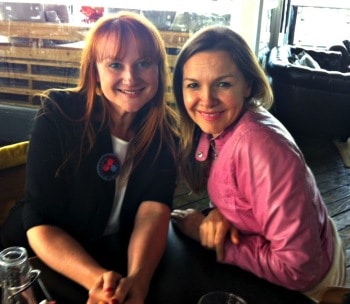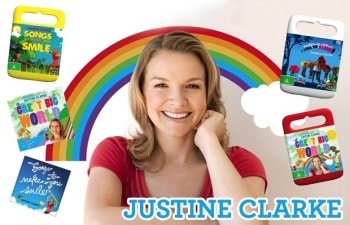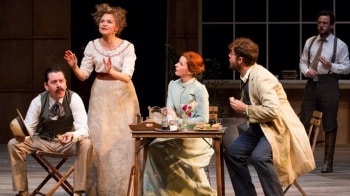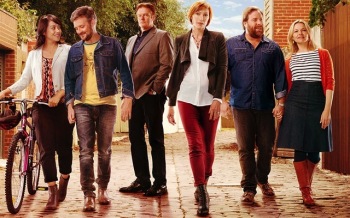How We Do What We Do: Justine Clarke with Marika Aubrey
To anyone who knows me, it’s no secret that I have coveted an opportunity to include Justine Clarke in this series since it’s initial birthing. I am hopelessly in love with her career as in my opinion it includes all the ingredients any strong actress who can sing could hope for in the Australian industry. Talent crush? YEP.

Justine has graced the Sydney Theatre Company stage in Cyrano De Bergerac and Hedda Gabler, and worked with Belvoir St in Toy Symphony. She scored an AFI nom for Best Actress her lead role in the feature film Look Both Ways, has drawn us into the compelling world of TV’s Tangle and the hugely popular Time Of Our Lives and best of all, become a Play School presenter and one of Australia’s best loved children’s entertainers – with four albums keeping the little ones singing and winning Justine an ARIA along the way.
Not bad, eh?
I meet Justine on a quick break between a rehearsal run and then a tech for Maxim Gorky’s Children Of The Sun, currently playing at The Opera House until October 25th and over a (much needed I imagine) coffee, discuss how Justine Clarke does all that she does.
Give Me A Child At Seven and I Will Show You The Man
Marika: You’re our very first child actor to be on this series.
Justine: Really?
Marika: Yeah. How did you go from child actor into ‘serious-grown-up’ actor? Because you were really young when you did Home and Away (Clarke played the much loved character Roo Stewart in 1988/89), right?
Justine: I was 16 when I started Home and Away, and already had been working since I was seven.
Marika: Wow. Was it always work, or was it just this fun thing that you did, like piano lessons? Is that what it feels like when you are a kid?
[pull_left]I was 16 when I started Home and Away, and already had been working since I was seven[/pull_left]
Justine: Yes it did, except Home and Away had more of a job feel to it, because you have to turn up every day and there was so much content to get through in a week.
Marika: Was it just assumed because you’d always acted as a child, you’d keep doing it as a career?
Justine: No, it wasn’t. I really did kind of have to make the decision to continue to do it as an adult. I didn’t really make that decision until I was about 19. I did a play at the Karnak Theatre-
Marika: -Forgive me, I don’t know where that is.
Justine: …It’s an outdoor theatre, past Port Douglas, in the rainforest. An outdoor theatre in a rainforest. Think about that for a sec…
Marika: Ha! Cassowary birds coming up behind you…?!
Justine: And the rain.
Marika: Oh, tropical rain…
Justine: Yeah. So in our month’s season I think we only did about 14 shows. I think we played less than half the run because it rained.
Marika: If that’s not going to break you then what will?
Justine: That’s right. I realised working with very experienced actors – I was the only young and the other actors were all in their 40s and older – I realised I had no skills, and I wasn’t consciously making any decisions about how I was going to interpret the work. I was just using my instinct, which is what I’d always used. From working as a kid, that’s what you do. You just do what comes naturally, and people go ‘yeah, that’s great, keep doing that’. You don’t get a lot of direction when you’re a kid. But I’ve always loved getting direction. I very quickly discovered, working with Jane Harders and John Stanton in particular, who both have very beautiful voices, that I didn’t have any skills. So I went okay, I’m going to go to drama school.
Roo Goes Back To School
[pull_left]I realised I had no skills, and I wasn’t consciously making any decisions about how I was going to interpret the work. I was just using my instinct[/pull_left]
Marika: As someone who was already a household name, I imagine, from Home and Away, it must have been kind of weird then to go to drama school, in some ways? Perhaps for other people?
Justine: Yeah. Maybe for other people. But I’m so glad I did it. So glad I did it. Because I did learn so much. I discovered a passion for theatre.
Marika: Which drama school did you go to?
Justine: I went to VCA. I made the decision that I wanted to work in the theatre.
Marika: If this series is called How We Do What We Do, did the time at VCA largely shape how you work?
Justine: Yeah.
Marika: Still?
Justine: Yeah, definitely.
Marika: Is there any particular process?
Justine: No, I don’t think so. I think they chucked so many different things at us. I look back at it now and I think it’s amazing actually, that anything stuck, because you get so many different…
Marika: Ingredients.
Justine: Yeah, thrown at you, and not a lot of time really to delve very deeply into any particular technique. But a little bit of everything stuck and I have my own process that changes and grows, hopefully, but is very much born of having trained and had that time to kind of indulge and explore a little bit.
Marika: It was a positive time?
Justine: I was in my 20s… so it was full of tears and heartache, but it was also really positive. You know, Shakespeare classes, or lying on the floor doing Feldenkrais every day, those kind of things.
Marika: I look back at some of the things that I did at drama school and go… wow.
Justine: Oh my God, same here! I still get embarrassed when I think of some of the self-devised pieces that I did.
Marika: And the people you go through those years with, you always have those ‘in-jokes’ – They’ll be just random lines from plays that can be said at any moment. I’ve been ‘out’ now for 12 years and one of my drama school mates will say something random, and we all kill ourselves laughing because it’s from that day in a Meisner class where someone repeated that word so many times, it’s ingrained in our brains.
Justine: Or somebody farted in a movement class or something.
Marika: Yep, that happened too!
There’s A Bear In There…

Justine: I think that’s come about through a few things. I always wanted to be on Play School just because I watched it from the beginning when I was little, and always really loved it. I have a very strong memory of being around 10 or 11, and still wanting to watch it, not from any other perspective than just that they were such good actors. They were so engaged and they had such great rapport with each other. They were great storytellers. I was drawn to watching these actors take on this role of presenter, and how they used their skills. I was always very impressed and amazed at them. I wanted to be as good as them. I always wanted to be on the show. So that’s part of it, I think.
Then there’s music, which has always been in my life. Then it just so happened that the new pianist on Play School – Peter Dasent – came along when I came along as well. So we were kind of part of a new wave of presenters. The show was changing slightly. It never changes…
Marika: But it always changes.
Justine: …not enough for you to notice, but it does change. Peter asked me to record them to present to Play School, and Play School said that they weren’t really Play School songs. But I said, I really like them, why don’t we just record them anyway? So it was really born out of the material.
Marika: That’s great, yeah.
Justine: Then there is my mum, too. Mum ran a crèche and she’s always nannied and looked after kids – and been such a great carer. So I think it’s a little bit in my blood as well. I didn’t know if I was going to love it as much as I do. That only came about through starting to do live shows.
Marika: There’s a real skill to that.
Justine: Yeah, there is, and that’s taken a while to find out who I am in that. It didn’t make long to figure out that I liked it, and what a great audience kids are. It’s just grown out of all those things.
Just Keep Singing
Marika: I want to talk a little bit about the music element to your career. How did you manage to nurture that part of you and still be seen as a ‘serious’ actor? I don’t know if you’re aware of this, but that’s quite hard to do in this country. There’s not a lot of people who have managed to not have a very compartmentalised career. Are you aware of that?
Justine: So, like being a music theatre actor or a singer?
Marika: Yeah, being able to get both of those things happening seemingly concurrently is a really amazing thing. Was it conscious?
Justine: Not really, but I think I stayed with what I knew. I stayed small, in a way, and stayed with where people wanted me. I didn’t try to make a big splash. I think that might be why I’ve been able to continue to do it. The bands that I was in and the music I’ve played was very different to the work that I was doing as an actor.
Marika: A completely different world.
Justine: Different world. Funk, pop, a country band, really all kinds of different styles of music.
Marika: You always saw them kind of as independent flexing of muscles in different ways, I guess?
Justine: Yeah, separate things.
Children Of The Sun

Justine: Yeah, I have, actually. I’m glad this is my home.
Marika: Well you find a company and you get on well, and they like you, and you like them, and then it stands to reason you will work together again. What’s the joy and the challenge of this play that you’re working on right now?
Justine: The joy is in the comedy. It’s very funny, and the actors are very funny. Hamish Michael is captivating. So is Toby Truslove. But everybody is. Also the writing. Definitely in the writing. The joy of working with those great women too, like Jacqui (McKenzie) and Helen (Thomson), who have been my idols.
Marika: There’s a truly formidable female line-up in that show.
Justine: Well yeah, that’s a big part of the joy. The challenge is to – there’s a lot of very big ideas in this play. Very current ideas. But dense ideas too. You want to be able to get those ideas across. That’s a challenge for all of us, is to get them across clearly.
Marika: I’m not familiar with the play. Is it very thick in it’s language?
Justine: They’re intelligentsia. So their arguments are very complex, but they’re all very clear about their point of view. Their point is very clear. They speak to think. They’re incredibly articulate people. It’s not always the case with Australians. That’s a stretch. But it’s good. It’s really rigorous, good for your brain.
Marika: Yeah.
Justine: It’s a beautiful play. It’s really beautiful.
The Time Of Her Life

Marika: I feel like I ought to ask you about your TV work purely because so many people will have just finished watching the wonderful Time of Our Lives – it’s just finished airing on ABC. You’re part of this new wave of really excellent TV that we have here in Australia, with Love My Way and Tangle and now Time of Our Lives, and I just wanted to talk a little bit about how it feeds you differently from stage?
Justine: It’s an interesting question. I think it becomes a way of life more than theatre does, because you’re in a studio or you’re on set for such long periods of time, from dawn til dusk. So your home life is reduced and your family become the people who are playing your family, including the crew. Everybody’s got to look after each other because everyone’s working really long hours, and working towards this one goal. There’s always a time limit. So the whole process is much more all encompassing. Theatre’s more like a great big puzzle. You’ve got to fit all the pieces, it’s going to come together and then you can put it on.
Marika: But you also have the period of a run to keep discovering or keep that alive.
Justine: That’s right.
Marika: As opposed to, I guess, that finality in TV in some ways.
Justine: Absolutely. Constant compromise or trust. A lot of trust involved in your own work. You’ve got to trust yourself. In order to move on you’ve got to go ‘yep, let’s just keep going. Good’. Whereas I think I like the process in theatre of feeling like I can always do better.
Marika: To go again.
Justine: And to have – by the end of the run, if you haven’t got it all in one show, at least you’ve got it all at some point. You’ve been able to clear up those moments or illuminate that bit. By the end of it, there’s a satisfaction in that. I did it so many times and I did it, I got it.
You Know We Belong Together…
Marika: Finally, I have to bring this up because it made me giggle… Were you in Home and Away – The Musical?
Justine: Yes, the musical.
Marika: What do you mean!?! What is that?
Justine: I did a panto in the UK. I did Snow White and the Seven Dwarves with the same company that then came back out to Australia, right at the height of Home and Away’s popularity. They came back out to Australia and they pitched this idea for a musical of Home and Away to a very big touring company that tours all over the UK, and they pre-sold it to 17 different towns across the UK. So it was five original cast members, five Australians, and five British actors playing some of the characters.
Marika: Doing Australian accents?
Justine: Hmmm. Trying.
Marika: And there was music in it. Title song, of course.
Justine: Yes.
Marika: Which is kind of catchy.
Justine: Well, there was [sings] “Summer Bay, we like it, here to stay, we love it. Summer Bay belongs to you…”
Marika: Wow, like a legitimate musical!!!
Justine: And the girls were all in bikinis and the boys were in board shorts.
Marika: Oh my God.
Justine: There was a big wave set. It would either garner the response of it being hysterically funny – university students would come and smoke pot and laugh at us. That’s my memory of it, people just thinking it was wonderfully ridiculous. Then other fans just completely loved it.
Marika: British people take our soaps very seriously.
Justine: They really do. But this was so bad, it was hard to take it seriously. It was hard for us to take it seriously, I have to say.
Marika: That is brilliant. Where is the DVD?
Justine: Well that’s another story. I went on stage with a camera! I was like, ‘we have to get some sort of record of this’. So I went on stage with a little handheld camera and filmed it from the stage as if that was part of the scene. That’s how kind of bold we were. I just filmed it.
Marika: Probably don’t try that in Children of the Sun.
Justine: No, I don’t think I’ll do that. Get the iPhone out. No.
Marika: Out from behind your corset.
Justine: Yeah.
Marika: Click.
[laughter]
Justine: So I filmed Home And Away The Musical. But then my camera got stolen from my flat in St Kilda, so all the record of it is gone. I sometimes wonder if it actually happened. It really did.
Marika: I wonder if it will ever surface up on YouTube somewhere.
Justine: I wonder.
Marika: That would be delightful.
Justine: Oh my God. I would be horrified. Horrified.
[laughter]
